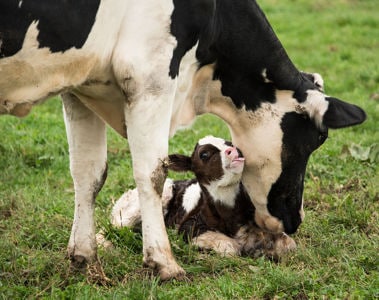Aufy, A.; Steiner, T.; Watkins, M., 2011: What phytogenic additives can do for your calves. International Dairy Topics., 10, 15–17.
Brand, T.; Hünerberg, M.; Mcallister, T. A.; He, M.; Saleem, A. M.; Shen, Y.; Miller, B.; Yang, W., 2019: Impact of a phytogenic feed additive on growth performance, feed intake, and carcass traits of finishing steers. Translational Animal Science., 3, 1162–1172.
Da Silva, C. S.; de Souza, E. J. O.; Pereira, G. F. C.; Cavalcante, E. O.; de Lima, E. I. M.; Torres, T. R.; da Silva, J. R. C.; da Silva, D. C., 2017: Plant extracts as phytogenic additives considering intake, digestibility, and feeding behavior of sheep. Tropical Animal Health and Production., 49, 353–359.
Groot, M. J.; Berendsen, B. J. A.; Cleton, N. B., 2021: The Next Step to Further Decrease Veterinary Antibiotic Applications: Phytogenic Alternatives and Effective Monitoring; the Dutch Approach. Frontiers in Veterinary Science., 8, 709750.
Karaskova, K.; Suchy, P.; Strakova, E., 2015: Current use of phytogenic feed additives in animal nutrition: a review. Czech Journal of Animal Science., 60, 521–530.
Kholif, A. E.; Hassan, A. A.; El Ashry, G. M.; Bakr, M. H.; El-Zaiat, H. M.; Olafadehan, O. A.; Matloup, O. H.; Sallam, S. M. A., 2021: Phytogenic feed additives mixture enhances the lactational performance, feed utilization and ruminal fermentation of Friesian cows. Animal Biotechnology., 32, 708–718.
Khorrami, B.; Khiaosa-Ard, R.; Zebeli, Q., 2021: Models to predict the risk of subacute ruminal acidosis in dairy cows based on dietary and cow factors: A meta-analysis. Journal of Dairy Science., 104, 7761–7780.
Krämer-Schmid, M.; Lund, P.; Weisbjerg, M. R., 2016: Importance of NDF digestibility of whole crop maize silage for dry matter intake and milk production in dairy cows. Animal Feed Science and Technology., 219, 68–76.
Matloup, O. H.; Abd El Tawab, A. M.; Hassan, A. A.; Hadhoud, F. I.; Khattab, M. S. A.; Khalel, M. S.; Sallam, S. M. A.; Kholif, A. E., 2017: Performance of lactating Friesian cows fed a diet supplemented with coriander oil: Feed intake, nutrient digestibility, ruminal fermentation, blood chemistry, and milk production. Animal Feed Science and Technology., 226, 88–97.
Piran Filho, F. A.; Turner, T. D.; Mueller, I.; Daniel, J. L. P., 2021: Influence of Phytogenic Feed Additive on Performance of Feedlot Cattle. Frontiers in Animal Science., 2, 1–9.
Plaizier, J. C.; Khafipour, E.; Li, S.; Gozho, G. N.; Krause, D. O., 2012: Subacute ruminal acidosis (SARA), endotoxins and health consequences. Animal feed science and technology., 172, 9–21.
Rivera-Chacon, R.; Castillo-Lopez, E.; Ricci, S.; Petri, R. M.; Reisinger, N.; Zebeli, Q., 2022: Supplementing a Phytogenic Feed Additive Modulates the Risk of Subacute Rumen Acidosis, Rumen Fermentation and Systemic Inflammation in Cattle Fed Acidogenic Diets. Animals.
Rodrigues, I., 2013: A holistic view on the use of phytogenic feed additives. International Poultry Production., 20, 7–11.
Schieder, C., 2014: Supporting calves with phytogenics for higher performance. International Dairy Topics., 13, 11–13.
Steiner, T., 2013: Phytogenics-digestibility is the key. All About Feed., 21, 28–29.
Steiner, T.; Syed, B., 2015: Phytogenic feed additives in animal nutrition. Medicinal and aromatic plants of the world: Scientific, production, commercial and utilization aspects., 403–423.
Takiya, C. S.; Ribeiro, V. C.; de Almeida, C. V; Bugoni, M.; Vittorazzi Jr, P. C.; Chesini, R. G.; Grigoletto, N. T. S.; de Freitas, A. C.; Vieira, D. J. C.; de Souza, A. H., 2023: Feeding phytogenic ingredients combined or not with Lithothamnium calcareum and a mycotoxin binder to lactating cows: effects on performance, nutrient digestibility, physiological parameters, and nitrogen excretion. Animal Feed Science and Technology., 115718.
Wickramasinghe, H. K. J. P.; Stepanchenko, N.; Oconitrillo, M. J.; Goetz, B. M.; Abeyta, M. A.; Gorden, P. J.; Baumgard, L. H.; Appuhamy, J. A. D. R. N., 2023: Effects of a phytogenic feed additive on weaned dairy heifer calves subjected to a diurnal heat stress bout. Journal of Dairy Science., 106, 6114–6127.


